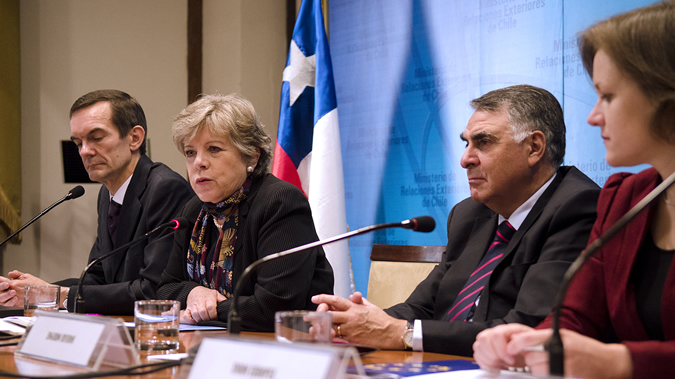Countries of the Region Exchange Positions Ahead of Agreement to Combat Climate Change
Work area(s)
Chile hosts a meeting of chief negotiators from Latin America and the Caribbean, with the support of ECLAC, the EU, UNEP and France.

Senior officials from Latin American and Caribbean countries began participating today in a meeting in Santiago, Chile to exchange positions about the content of an accord to combat climate change that is expected to be approved during the 21st session of the Conference of the Parties to the United Nations Framework Convention on Climate Change (COP21), which will be held in Paris next December.
The inauguration of the meeting was presided by Chile’s Under-Secretary of Foreign Affairs, Edgardo Riveros; the Executive Secretary of the Economic Commission for Latin America and the Caribbean (ECLAC), Alicia Bárcena; France’s Ambassador to Chile, Marc Giacomini; the Head of the Political Section of the European Union Delegation in Chile, Alexandra Knapton; and Andrea Brusco, Legal Officer for the Regional Office for Latin America and the Caribbean of the United Nations Environment Programme (UNEP).
This event has been organized by ECLAC through the EUROCLIMA programme financed by the EU, along with UNEP, and promoted by the Governments of Chile and Brazil. In addition, it receives the support of French Cooperation.
The Chilean Under-Secretary of Foreign Affairs, Edgardo Riveros, said that the region has a historic opportunity to make a decisive contribution that reflects its capacities and priorities while also promoting a humane negotiation based on the concept of climatic justice, given that environmental degradation is a factor that deepens inequalities.
France’s Ambassador to Chile, Marc Giacomini, said that the COP20 in Lima made progress thanks to the drafting of a preliminary text for negotiations, which is the basis for this year’s discussions, and to the definition of the process for preparing national contributions, which have been presented by seven countries, including Mexico. Giacomini indicated that at the COP21 France seeks to support a process for a “Climate Alliance” in order to reach an ambitious accord that is forged collectively.
In that sense, Alexandra Knapton, the EU’s representative in Chile, said that the EU submitted its intended contributions (INDCs) in March 2015 and commits to reducing its greenhouse gas emissions 40% by 2030, versus 1990 levels. In addition, European leaders agreed to new climate and energy policies for 2030, with concrete goals such as increasing the production of renewable energy to at least 27% of the total. “We hope that the countries of Latin America and the Caribbean also show leadership and present ambitious contributions for mitigation,” she said.
Meanwhile, ECLAC’s Executive Secretary, Alicia Bárcena, emphasized the asymmetries of climate change since Latin America and the Caribbean produces just 9% of global carbon dioxide emissions but it is one of the regions most vulnerable to global warming. “There are common but differentiated responsibilities,” she stressed.
The region also faces the challenge of combating this phenomenon while also trying to reactivate the economy and bolster its development. For that reason, this United Nations organization proposes that countries build a countercyclical investment architecture with a portfolio of low-carbon projects, she explained. “Our goal is development with equality at the center, which requires diversified production,” Bárcena said.
“We have the means to limit the effects of climate change,” said Andrea Brusco, representative of the UNEP, who indicated that in Paris the world will have an opportunity to reach an ambitious global accord to tackle this phenomenon and prevent the temperature from rising more than 2 degrees Celsius, because it is estimated that breaching that threshold would have catastrophic effects.
According to the Intergovernmental Panel on Climate Change (IPCC), the cost of global warming could be between 0.5% and 2% of global GDP by mid-century, even in a scenario in which decisive adaptation measures are adopted. Meanwhile, ECLAC estimates that a temperature rise of 2.5 degrees Celsius would cause losses equivalent to about 3% of the regional GDP in Latin America and the Caribbean by the year 2050.
Representatives from 20 countries in the region are attending this 4th Meeting of Chief Climate Change Negotiators of Latin America and the Caribbean. The gathering is being held May 14-15 at Chile’s Foreign Affairs Ministry.
This regional dialogue has also been backed by Ecuador, which holds the Presidency Pro Tempore of the Community of Latin American and Caribbean States (CELAC), and by Peru, which hosted the COP20 last December and will hold the Presidency of the Convention until next December, when France takes the helm.
Subregional headquarter(s) and office(s)
Subregional Headquarters, MexicoCountry(ies)
- Latin America and the Caribbean
Related project(s)
Contact
Public Information Unit
- prensa@cepal.org
- (56 2) 2210 2040
